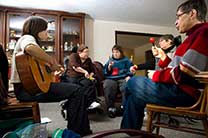Preparing for the future can be daunting for parents or caregivers of children with intellectual and developmental disabilities (IDD). Many want to be more proactive in finding residential services for their children and also have resources to contribute to a home and supports. However, many have found, amid the countless details involved, that there is no single source of information or assistance to navigate the often confusing system of public services and funding.
That’s where Parent Compass comes in.
Parent Compass provides:
- A complete source of information for family-directed housing, also called a consortium
- Information and support to empower family member and caregivers to meet their child’s residential needs
- Answers common questions
- Insight on topics you may not have considered before
“We are the conductors of the symphony of caring, comfort, and support for our relatives. No one else has the breadth of vision and the passion.” – Al Etmanski, A Good Life The information here comes from several sources:
- Interviews with families who have been through the process
- County boards of DD
- Service providers
Developing the best possible home and supports can be time-consuming, difficult and frustrating. Who better, though, to meet the challenge than parents?
You may ultimately decide that family-directed housing does not meet your family’s needs. If so, it is still important to follow some of the steps, especially those found in Individual Future Planning.
If, on the other hand, you are interested in pursuing a family-directed housing, but feel overwhelmed, take this process one step at a time beginning with Residential Options You Should Know.
The goals, after all, are worth pursuing: independence, new opportunities, and an exciting future for parents and their children.
A Few Things to Know:
- The system of supports operates differently in each state. This manual addresses the system in Ohio. Funding and support can be found from multiple sources.
- Parent Compass is for any person helping a friend or family member with intellectual or developmental disabilities (IDD) plan for the future. For simplicity, the term “parent” is used throughout. Likewise, the use of “child” refers to this relationship and not to an individual’s age or maturity.
- Every attempt has been made to avoid professional jargon or uncommon abbreviations. The glossary defines many terms.
- Nothing in this manual should be considered legal advice. Please consult your attorney, financial planner, or other professionals before making important decisions.
How to Use Parent Compass
Using Parent Compass in the following order will help you navigate family-directed housing options in the most efficient manner.
-
Residential Options You Should Know
Explains family-directed housing and gives a brief overview of the options and things to consider.
-
Individual Future Planning
Provides information about individual planning. You may find this helpful, even if family-directed housing turns out not to be the best option for your child.
-
Planning for Family Directed Housing
Explains the planning process for family-directed housing, including how to find compatible housemates.
-
The House Hunt
Provides things to consider when looking for actual properties.
-
Support Services
Explains support services, including funding, choosing, and managing support staff.
-
Making the House a Home
Offers information on managing daily life in family-directed housing including housekeeping and maintenance.
-
Resources
List of resources
-
Glossary
Glossary of terms and acronyms.
-
Forms
Worksheets and checklists to use during planning and development of a home.
-
Appendix A
The financial and legal aspects of individual planning.
-
Appendix B
Describes the workings of the County Board and public services system.
-
Appendix C
Information about working with support services providers.













